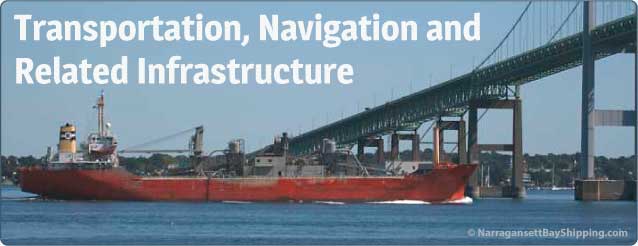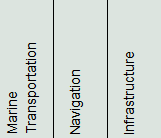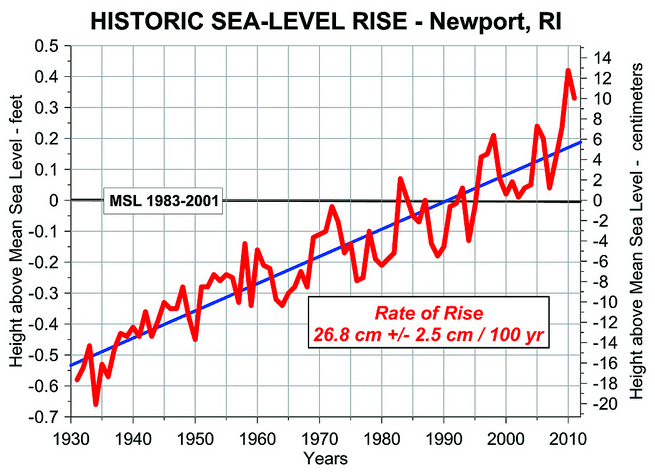
Photo Credit: NarragansettBayShipping.com
One if by Land, None if by Sea?
Marine transportation, navigation, and related infrastructure in Rhode Island includes transport by sea of various types of goods and services as well as people, and involves related issues including navigational routes and ports and harbors. Narragansett Bay and its surrounding marine waters are a high-revving economic engine for the Ocean State.
Almost all facets of climate change have an impact on these uses of marine waters. (See chart below)
In Rhode Island waters, cargo ships, such as petroleum tankers and bulk carriers, bring coal for our electricity and salt for our roads after snowstorms. Tugs and barges carry construction materials used to build our homes and institutions. Passenger ferries; naval vessels; government research, enforcement, and search-and-rescue vessels; and pilot boats all transit along the state’s busy waterways. And to keep it all running smoothly, the marine transportation system is a complex network of features — including shipping lanes, traffic separation schemes, navigational aids that facilitate safe passage of vessels. On top of all that, the adjacent land-based infrastructure, such as cargo handling facilities and storage areas, roads, highways, rails, and bridges surround the state’s ports all come together to keep the economy moving along.
The Extended Shipping Season
One potential positive impact of climate change is on the extended shipping season. Shorter winters and quicker transport times mean more revenues and, hopefully, lower expenses. Scientists project the increasing air temperatures will reduce icing in waterways and on vessels and infrastructures for many parts of the world.
However, coastal and offshore infrastructure may be subject to greater damage from more intense storms and increased decay from increasingly acidic seas. Coastal infrastructure is more likely to be flooded by higher sea levels, and more coastal infrastructure will be exposed to higher wave loads and tidal fluxes, increasing fatigue and corrosion. The increased vulnerability of infrastructure is one of the hidden costs of doing business that is often noticed only when it jumps up and bites you, usually too late for you to do anything about it.
The net impact on Rhode Island shipping that will result from climate change remains unclear.
More about all the ways Marine Transportation and Infrastructure can be affected (Adobe Acrobat)
Summary of Climate Change Impacts on Marine Transportation, Navigation, and Infrastructure in Rhode Island
Climate Change Variable |
Potential Impact |
 |
||
| Increasing air temperatures | Extended shipping season and use of infrastructure | + | n/a | + |
| Degradation and shortened lifespan of ships and infrastructure | - | - | - | |
| Reduced icing in waterways and on vessels and infrastructure | + | + | + | |
| Increasing sea level | Increased exposure to infrastructure (corrosion) | - | n/a | - |
| Increased likelihood of flooding/inundation of coastal infrastructure | - | n/a | - | |
| Need for higher passing height for bridges | - | - | - | |
| May increase navigability of waterways | + | + | + | |
| Increase in storm intensity | Changing movements of sediment (erosion/accretion) | - | - | - |
| Increased degradation and vulnerability of infrastructure (coastal and offshore) | - | n/a | - | |
| Loss/retreat of land (for associated infrastructure) | - | n/a | - | |
| Increase in unsafe condition and poor visibility for navigation/transferring cargo | - | - | - | |
| More need for emergency planning and rescue | - | n/a | - | |
| Increasing precipitation and decreasing wind speed | May result in changing currents | ? | ? | n/a |
| Changes in sediment transport (erosion/accretion) | - | - | - | |
| Longer summers and decreased snow season | Extended shipping season and use of infrastructure | + | n/a | + |
| Reduced icing on vessels and infrastructure | + | + | + | |
| More acidic ocean | Increasing corrosion rates of vessels and infrastructure | - | n/a | - |
| Key:
+: potentially positive effect –: potentially adverse effect n/a: no significant anticipated effect ?: unknown impact |
||||
Adapted from Rhode Island Ocean Special Area Management Plan (SAMP)
“It is not the going out of port, but the coming in, that determines the success of a voyage. ”
– Henry Ward Beecher
“To reach a port we must sail, sometimes with the wind, and sometimes against it. But we must not drift or lie at anchor.”
– Oliver Wendell Holmes
News
“Tourists Are Flocking to Locations Threatened by Climate Change. That Only Makes Things Worse.” Vox
Factoids
All the ports in southeastern New England, including Narragansett Bay and Mount Hope Bay, were closed multiple days as a result of Superstorm Sandy.
Increasingly severe weather events, such as hurricanes, cause extensive and costly damage to ports and harbor facilities.
Sea level rise poses a serious threat to port infrastructure and may cause significant disruptions to shipping if facilities are flooded or damaged.





